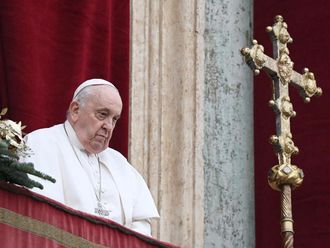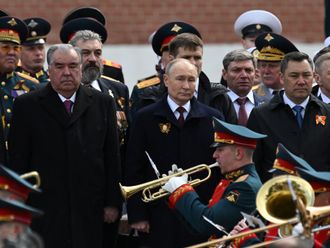Dubai: A low-key public inquiry is investigating allegations that soldiers from the United Kingdom mistreated, abused and murdered Iraqis in 2004 in Basra. Here is a guide to why the Al Sweady Inquiry was called and what it is investigating
What is the Al Sweady Inquiry about?
The Al Sweady Inquiry is considering allegations the human rights of a number of Iraqis — mostly men — were abused by British troops in the aftermath of a skirmish that took place during the Iraq war.
On May 14, 2004, soldiers from the Argyll and Sutherland Highlanders and the Princess of Wales Royal Regiment were ambushed by insurgents, leading to a three-hour gun battle. At one stage, fighting was so intense and so close, the soldiers used bayonets. This became known as the “Battle of Danny Boy”, named after a British checkpoint near the town of Majar Al Kabir in southern Iraq. During the battle, Sergeant Brian Wood, of the Princess of Wales was awarded the Military Cross.
After the battle, an order was issued to take the bodies of the dead Iraqis to a nearby military base, Camp Abu Naji.
What the army says
The British army says it wanted to check whether one of the dead Iraqis was an insurgent thought to have been involved in the killing of six Royal Military Police officers in 2003. It says nine Iraqi men were taken captive and they all stayed alive.
What the Iraqis say
Lawyers acting for the men and the families of the dead claim that some of the dead were taken alive and then unlawfully killed at Camp Abu Naji. It is also claimed detainees were mistreated after the battle and at Camp Abu Naji as well as later on at Shaibah Logistics Base.
Can both sides agree on anything?
Both the Iraqis and the UK Ministry of Defence (MoD) agree that, on May 15, 20 bodies were returned to the Iraqis. They disagree on almost everything else. British troops and their lawyers vigorously deny the claims they murdered wounded Iraqis, that some were tortured, or that some were abused while in British custody. The Iraqis say civilians were killed, wouned fighters were murdered, and that those taken captive were abused and tortured.
What is the history of the legal proceedings?
At a High Court judicial review in 2009, Khuder Al Sweady, an Iraqi national, claimed that his 19-year-old nephew, Hamid Al Sweady, was one of those said to have been unlawfully killed while in the custody of British troops at Camp Abu Naji between 14 and 15 May 2004.
Five of the nine men taken captive by the Army also alleged in the judicial review that they were mistreated by British soldiers while in custody at Camp Abu Naji and when later detained — for about five months — at Shaibah Logistics Base.
Who called the inquiry?
In 2009 the then UK Defence Secretary, Bob Ainsworth, announced an inquiry would take place.
It came after his department was criticised by High Court judges during the action brought by the six Iraqis. They said the department’s handling of disclosure of documents had been “lamentable”. During the proceedings, Ainsworth conceded there was insufficient information for judges to be able to make a fully-informed decision on the allegations, so a separate investigation was needed. The inquiry, named after Hamid Al-Sweady, was set up in 2010. It is being chaired by retired High Court judge, Sir Thayne Forbes.
What is the inquiry’s remit?
“To investigate and report on the allegations made by the claimants in the Al Sweady judicial review proceedings against British soldiers of unlawful killing at Camp Abu Naji on 14 and 15 May 2004, and the ill-treatment of five Iraqi nationals detained at Camp Abu Naji and subsequently at the divisional temporary detention facility at Shaibah Logistics Base between 14 May and 23 September 2004, taking account of the investigations which have already taken place, and to make recommendations.”
Why is the inquiry taking so long?
The first stage of the inquiry, which searched for relevant documentation and other materials, began in 2010. Oral hearings only began in March of 2013. The inquiry had to approach more than 600 military personnel and about 100 Iraqi witnesses and had searched thousands of files of paper and digital material. That the facts were “hotly disputed” and that events took place nine years ago in another jurisdiction also helped to explain the length of the inquiry.
What has happened in the oral hearings?
Evidence from Iraqi witnesses was heard from March to July in Beirut. Those who gave evidence or provided witness statements included the nine detainees and relatives of the 20 dead men, who have all been named in inquiry documents. Some of the witnesses came to London to give evidence while others gave evidence via video link.
The first of up to 200 British military witnesses began to give evidence on Monday, September 2, and testify on the the battle, returning bodies to Camp Abu Naji and the treatment of detainees there, and the movement of the detainees to Shaibah Logistics Camp and their treatment and interrogation there.
The inquiry is due to report by the end of 2014.
What do the Iraqis want to establish?
They want to know if Iraqis died in British custody, and if so how many. Their lawyer, John Dickinson, has said: “The essential complaint is that a number of Iraqis were taken from the battlefield alive and either in transit to the camp or at the camp were summarily executed.”
All nine detainees also made complaints, heard in the first phase of oral hearings, about the way they were treated and interrogated. Those men are named in Al Sweady inquiry papers as Hamzah Joudah Faraj Al Malje, Mahdi Jasem Abdullah Al Behadili, Ebrahim Gattan Hassan Al Esmaili, Kadhim Abbas Lafta Al Behadili, Abbas Abd Ali Abdul Ridha Al Hameedawi, Ahmad Jabbar Hammoud Al Furaiji, Hussain Fadhil Abbas Al Behadili, Atiyah Syed Abdul Ridha Al Baidhani and Hussain Gubari Ali Al Lami. Five of the men were aged 20 or under at the time, two were aged 18 and one was aged 17.
Their main allegations made in the oral hearings included that they were beaten on capture and when transported to Camp Abu Naji, strip-searched during “processing” and questioned “oppressively”, with abuse shouted, threats made and guns fired.
They also alleged they were sleep-deprived, hit, threatened, abused, deprived of sleep and subjected to tapes of screaming at Shaibah Logistics Camp.
— Compiled from agencies, BBC












